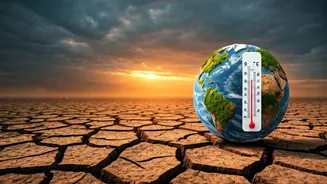1.5°C: Target Slipping Away
The World Meteorological Organization (WMO) has released a statement indicating that the world is unlikely to meet the 1.5°C global warming target. This
crucial threshold, set by the Paris Agreement, aimed to limit the rise in global average temperatures. However, recent data and trends suggest that an overshoot of this target is now probable within the next few years. The WMO's assessment is based on the escalating levels of greenhouse gases in the atmosphere, coupled with observed warming patterns across the globe. This represents a significant challenge to global climate efforts and highlights the need for more urgent and ambitious actions to mitigate the effects of climate change. The original aim was to avoid the most severe impacts of climate change, but this now seems a difficult target to achieve given the current trajectory.
Overshoot is Now Likely
The WMO's projections indicate that an overshoot of the 1.5°C target is highly probable in the coming years. This means that global average temperatures are likely to surpass this critical warming limit, at least temporarily. The consequences of such an overshoot could be significant, including an increase in the intensity and frequency of extreme weather events such as heatwaves, droughts, and floods. An overshoot could have a profound effect on ecosystems and human societies. It will likely cause further disruption in various sectors like agriculture, water resources, and public health. This underscores the urgent need to accelerate emission reduction efforts and enhance climate adaptation measures to minimize the adverse effects of surpassing the 1.5°C threshold and to stabilize the climate system as quickly as possible. The longer the overshoot lasts, the more severe the long-term impacts will become.
Rising Greenhouse Gases
The primary driver behind the anticipated overshoot is the continuous rise in the concentrations of greenhouse gases in the atmosphere. These gases, mainly carbon dioxide (CO2), methane (CH4), and nitrous oxide (N2O), trap heat and contribute to the warming of the planet. Despite global efforts to curb emissions, the levels of these gases continue to climb, fueled by human activities such as the burning of fossil fuels, deforestation, and industrial processes. The increased concentrations of greenhouse gases intensify the greenhouse effect, leading to the gradual increase in global temperatures. The long atmospheric residence times of these gases mean that even if emissions were to be significantly reduced today, their effects will be felt for decades to come, further contributing to the likelihood of exceeding the 1.5°C target in the near future. Reducing the sources of these gases is the most direct way to tackle the problem.
Impacts of Climate Change
The implications of exceeding the 1.5°C warming limit are wide-ranging and concerning. With rising global temperatures, the planet is experiencing more frequent and intense heatwaves, which pose significant risks to human health and increase the likelihood of wildfires. Changes in precipitation patterns lead to droughts in some regions and increased flooding in others, disrupting agriculture and water resources. The melting of glaciers and ice sheets contributes to rising sea levels, threatening coastal communities and ecosystems. These changes lead to disruption in food security, and displacement of populations. Furthermore, climate change is expected to exacerbate existing social and economic inequalities, making it crucial to implement comprehensive adaptation and mitigation strategies to address these challenges and protect vulnerable communities.
Climate Action Imperative
Given the WMO's assessment, it is now more urgent than ever to accelerate global efforts to combat climate change. This includes drastically reducing greenhouse gas emissions through a transition to renewable energy sources, improving energy efficiency, and implementing sustainable land management practices. In addition to mitigation efforts, it is crucial to enhance climate adaptation measures, such as developing resilient infrastructure, improving early warning systems for extreme weather events, and implementing sustainable agriculture practices. International cooperation and the active involvement of all countries, businesses, and individuals are essential to achieve meaningful progress. Strengthening climate policies and investing in climate resilience will be critical to safeguard the future of the planet and mitigate the adverse impacts of a warmer world. This includes continued research into climate science and the development of innovative solutions to tackle this pressing global challenge.



















